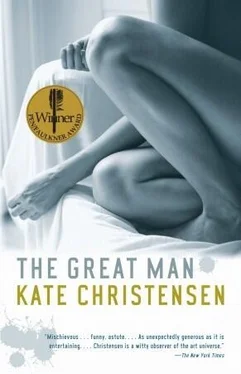Abigail handed her the cold bottle of Tecate she’d opened. “Oh gosh,” she said. “I don’t know. I was going to make an elaborate feast, but I…fell asleep.”
Samantha laughed. “I do that all the time. Big plans, then I conk out the minute these two go down.”
“I have no such excuse,” said Abigail.
The little boy squealed and slapped his baby sister, who smiled and blinked. He gave a wild-eyed grin to no one in particular. He looked like an evil little elf. He was about three years old, pale and thin, with bluish circles under his eyes and a fragile neck, but Abigail could see the potential for explosiveness in the manic corners of his mouth, his eyes darting to adults’ faces to gauge their reaction to him, the kinetic restlessness of his limbs. His baby sister was, by way of contrast, fat, placid, and unassuming.
“Buster, no,” said Samantha. “That’s uncalled for.”
Buster laughed at his mother, his whole face perverse and gleeful.
“Hey, Buster,” Abigail said, “I bet you can’t count backward from ten.”
He looked up at her. “Yeah I can.”
Abigail sat at the other end of the bench. “Come here and sit in my lap and prove it to me.”
Buster climbed into Abigail’s lap. “Ten nine seven,” he shouted, nestling against her. “Five three four one.”
“That is very good!” Abigail said, smiling at Samantha, who didn’t smile back. “I think you might have missed a few, though. Want to try one more time?”
He leapt off her lap and went over to the refrigerator, where he began making smeary palm prints on the shiny whiteness.
Abigail produced her two recipes. “I was going to make these. I got as far as boiling the potatoes.”
Samantha took them from her and looked them over. “Oh, how nice. But so much trouble! We could just have boiled potatoes and sliced cantaloupe.”
“You could use a good meal, looks like,” Abigail blurted. “Oh, gosh, I’m sorry.”
Samantha looked at Abigail. Then she took a slug of beer. “I’m too thin,” she said.
“Well, compared to me, anyone would be,” said Abigail.
“Since the kids were born, I just run around all the time.”
“Drink your beer. Put your feet up. I’m going to make this salad. Maxine was talking about tuna fish this morning and she got me craving it. What’s your little girl’s name?”
“Josephine,” said Samantha. “We named her after my husband’s grandmother. My husband is Ivan Sandusky. He’s a research scientist. He’s the smart one. I used to be a painter, but I gave it up when I had kids. I was into watercolor still lifes. Nothing like my father’s work at all. I was never going to set the art world on fire, so it’s no great loss, but I do miss it sometimes.”
“You should take it up again,” said Abigail.
“Maybe someday,” said Samantha. “For now, I want to concentrate on the kids. They grow up and leave before you know it. I don’t want to miss out.”
“ Some of them grow up and leave,” said Abigail, smiling.
“Oh!” said Samantha.
“Gallows humor,” said Abigail. She got up and rinsed the green beans in a colander. Then she sat down again and began to snap their noses and tails off.
“Oh, I can do that,” said Samantha with beery enthusiasm. She took the colander of beans from Abigail and began snapping them.
Abigail got up and pulled things from the shopping bag. “Let’s see,” she said, peering at the recipe. “A simple vinaigrette with shallots. Shouldn’t be too hard.”
“Want me to chop the shallots?” Samantha asked. “I wear contact lenses. I don’t cry when I cut oniony things; I think the lenses protect me.”
Abigail handed her the shallots, a knife, and a cutting board. She had been silently taking the measure of this daughter of her husband, assessing her. She was slightly nonplussed by how daughterly she was, how easily she had fallen into the role of younger, subservient, agreeable girl with a strange older woman; her affable chattiness didn’t match her drawn face. No wonder she was under so much stress; it must have taken a great deal of energy and work to constantly have to manufacture such an impenetrable shield.
“Are you close to your mother?” Abigail asked, whisking olive oil and vinegar together.
“This is weird, isn’t it?” said Samantha. “I mean, given the relationship between you and my mother, it’s weird that I’m sitting here. I asked Ruby to come with me, but she didn’t want to.”
“Ah,” said Abigail. “I can imagine she must feel loyal to your mother.”
“Actually, it’s our father she’s loyal to,” said Samantha. “She’s probably jealous of you, for seeing so much of him.”
“I didn’t see much more of him than you did,” said Abigail. She tasted the dressing and whisked in the shallots Samantha had minced. Cooking was easy once you got into the swing of it; it was just getting up the nerve to start something she’d always had trouble with.
“To answer your question, yes, I am close to my mother,” said Samantha. “I got the parent who was there all the time; Ruby got the parent who almost never was. So she’s freer than I am, in a way. Sometimes I resent her for it. So paradoxical. Because I couldn’t be happier with the way my own life has turned out, and I really don’t envy her at all, being single, with no kids, and having to work every day.”
Abigail began to assemble the salad, without the green beans, which Samantha had taken proprietary charge of and which Abigail had relinquished to her with some internal amusement; the heap of beans sat at Samantha’s elbow now, forgotten.
“Of course,” Samantha went on — Abigail noticed that her beer was nearly gone already—“I know that not every mother has the luxury of choosing to stay home with her children. But for all I always loved and respected my mother, I worked very hard not to end up like her. I chose a good provider for a mate. I chose to be a wife and mother, and not to work at all, not even to paint. I pour all my energy into my family. Ivan works just as hard to support us, and he comes home for dinner almost every night and puts the kids to bed. He couldn’t be less like my father. I don’t regret my choice: I saw how my mother worried about money, how hard it was for her to raise us alone. I always sensed my mother’s struggles through all her independent bravado, and although I was always extremely close to her, I swore never to turn into her. I have a feeling, although we have never talked about this, that Ruby did the same thing, but in the opposite direction, for a different reason.”
“Ah,” said Abigail, running cold water over the hot potatoes and hard-boiled eggs.
“Rube and I were so close when we were younger. And maybe we still would be if she were married now and had a baby or two. We would have so much to talk about. Also, if she had kids, Ruby might have learned to be more sensitive to others. She’s always stepping on people’s toes, hurting their feelings, my mother’s most of all. And all she seems interested in are things I, quite frankly, had hoped she would have outgrown by now. Boyfriends, drinking, traveling. Writing poetry. ”
“Some people write poetry well into their nineties,” said Abigail. “And travel and drink, for that matter. As for boyfriends…”
“We’re almost forty, for God’s sake. Ruby is stuck in her late twenties. She dresses like she’s in graduate school. She says she’s happy, but how can she be, really? And whenever I try to talk to her about my own life, my children and marriage, she acts bored, superior even, in a way I find galling and ignorant. She has no idea how motherhood makes you a different, really a better, person — more selfless, more giving, more mature. You know what I mean?”
Читать дальше












